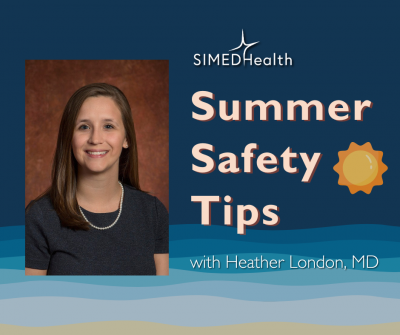
Florida Summer Tips
Summers in Florida involve spending time outdoors and in the sun. Dr. Heather London, a SIMEDHealth Family Medicine physician, discusses how to safely enjoy, and prepare for your summer.
1. How can we protect our skin and eyes from sunburn and sun damage?
It is recommended to wear sun protection at all times, even when it is not very sunny or when there are clouds. You should wear hats and clothes to cover up your skin to protect from the sun. Sunscreen should be reapplied often when outdoors or if you are swimming or sweating. Sunglasses are also a good option to protect your eyes from sun damage which can lead to eye health issues, such as cataracts or macular degeneration.
2. What are early signs of dehydration, and what actions should be taken if these signs appear?
Thirst and darker color urine are early signs of dehydration. Once you get thirsty, you are already behind on your hydration, so it is important to stay hydrated and avoid being thirsty by drinking water or sports drinks. If you are experiencing signs of dehydration you should try to take a break in the shade and drink plenty of fluids.
3. Insect bites cause reactions. How can I tell if an allergic reaction is starting and what should I do?
Insect bites are common in the summertime. It is normal to have a mild reaction at the site of the insect bite. A normal reaction can include swelling, redness, pain or itchiness. When the reaction is significantly larger than the area that was bitten, it may be an allergic reaction. For example- if you get an ant bite on your foot and your entire foot/ankle swell up, that is more likely an allergic reaction. For these reactions, you can try Benadryl and over the counter allergy medications and creams. Severe allergic reactions or anaphylaxis are possible and can cause trouble breathing, swelling of the face or throat, hives, fast heart rate, dizziness, nausea or stomach pain. These are treated as emergencies and 9-1-1 should be called immediately. If available an epi-pen should be used as soon as possible.
4. Should certain activities be avoided or limited because of medical conditions?
There is no hard and fast rule to say that a certain medical condition should make you limit or avoid summer activities. Generally, you can do activities based on how you feel. Some lung problems such as asthma or COPD can be worse in the heat or when exposed to chemicals in the air, such as smoke from a camp fire or grill or from chemicals in the pool. Certain medications for heart conditions may make you more likely to be dehydration or have low blood pressure which can be worse in the heat. Certain skin disorders and antibiotics can make your skin more sensitive to the sun and more likely to get sunburns. Your symptoms should dictate what you should be doing outside. You should avoid triggering activities if you can identify them, otherwise if you are feeling well, I encourage you to be active and enjoy many outside activities, which can improve your physical and mental health.
5. What are tips to safely enjoy outdoor summer activities like swimming, biking, and nature parks?
- Try to avoid doing outside activities during the middle of the day to avoid direct sunlight and excessive heat. Try to schedule activities in the early morning or later evening hours to help keep cool. Try to take breaks in the shade when possible.
- Always wear sun protection when outside. Reapply often, even more so when swimming or sweating.
- Always wear appropriate gear, such as helmets and closed toed shoes, when participating in outside activities such as biking, skating, or riding scooters.
- Use bug repellent to protect from mosquitos and other insects. Check for ticks after spending time outside hiking in wooded areas.
- Drink plenty of water. Bring enough water on extended hikes or biking trips to stay hydrated.
To learn more about Dr. Heather London, click here.
To schedule an appointment with SIMEDHealth Primary Care, click here.